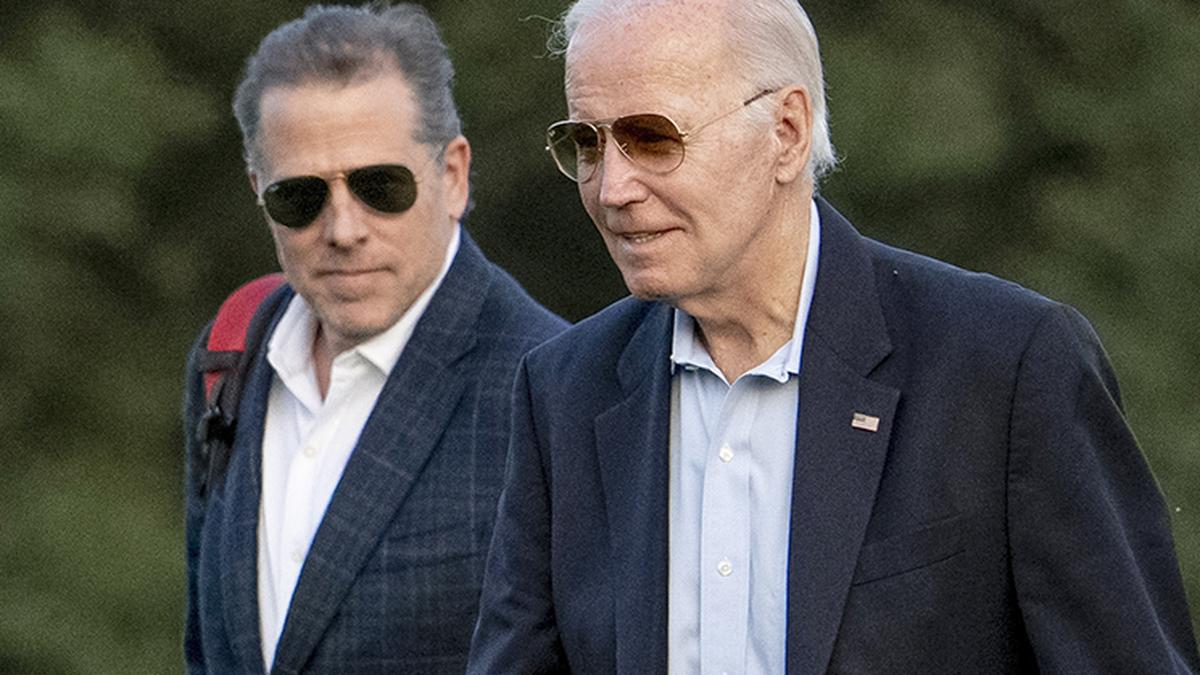
Explained | How will Biden impeachment hearings impact elections? Premium
The Hindu
House GOP moves to impeach Biden over unproven corruption allegations. Plan seen as attempt by McCarthy to score political points. Trump impeached twice before, now McCarthy seeks to balance the score. Inquiry to consider payments, influence peddling, and interference in IRS investigation. GOP risks voter blowback if Biden not convicted.
The story so far: Republican lawmakers, who have majority control of the U.S. House of Representatives, have moved forward with their plan to impeach Democratic President Joe Biden over unproven corruption allegations linked to the President’s son, businessman Hunter Biden. The move is seen as an attempt by House Speaker Kevin McCarthy to score political points at the start of the election campaign cycle.
The most significant factor that might have driven Republicans to seek the impeachment of Mr. Biden is the fact that his predecessor, Republican Donald Trump, was impeached twice. Mr. Trump was first impeached in 2019-20 over allegations of abuse of power and obstruction of Congress linked to his attempted coercion of the Ukrainian President Volodymyr Zelenskyy into conducting a criminal investigation of Hunter Biden. Mr. Trump’s second impeachment, which happened in early 2021, stemmed from the serious charge of “incitement of insurrection” linked to his role in encouraging the January 6 attack on the U.S. Congress buildings. Now, Mr. McCarthy hopes to balance the score by chalking up an impeachment against Mr. Biden, perhaps in the hope of dampening voter support for Democrats next year and gaining political capital in a house that has not always offered Mr. McCarthy its robust support. If the Republicans succeed in the House, Mr. Biden would be the fifth President in U.S. history to be impeached, following Andrew Johnson in 1868, Richard Nixon in 1974, Bill Clinton in 1998 and more recently, Mr. Trump.
Most of the allegations that the inquiry in the House will look into relate to the business dealings of Hunter Biden, including questions of whether Mr. Biden, as Vice-President during the two terms of former President Barack Obama, benefited from those dealings.
First, the inquiry will consider an August memorandum of the House Oversight Committee, which claimed that Mr. Biden, his family members and their business partners were paid more than $20 million by “foreign sources” from China, Kazakhstan, Romania, Russia and Ukraine. However, even the Chair of the Committee, Republican James Comer, later admitted that an extensive examination of bank records and other evidence did not yield any evidence suggesting that these payments or any benefit resulting therefrom went directly to Mr. Biden.
Second, House Republicans will seek to examine whether the Biden name was peddled as a “brand” in seeking to influence business decisions to the favour of the 46th President. Although a former business partner of Hunter Biden, Devon Archer, claimed that the senior Mr. Biden joined multiple phone conversations with business associates of Hunter Biden, a report from the Congressional Integrity Project, a Democrat-aligned watchdog group, said that “Mr. Archer’s testimony failed to produce a shred of evidence of any conflict of interest.”
Third, the House will in all likelihood take up several points of inquiry into allegations of impropriety in Hunter Biden’s business dealings, with implications for his father’s conduct. These include claims that Mr. Biden sought to pay off prosecutors to end an inquiry into Burisma, a Ukrainian energy firm on whose Board Hunter Biden had a seat. These claims, based on an “unverified FBI tip”, never resulted in evidence being unearthed in support. The Hunter Biden business dealings inquiry will also consider whether there could be any merit to the testimony of two whistleblowers who formerly served at the Internal Revenue Service, which allegedly suggests that the Justice Department “intentionally interfered in a multi-year investigation into Hunter Biden’s tax return” – a claim that has so far been denied by the department and refuted by the testimonies of several other witnesses called to the stand by Republican lawmakers.
Mr. McCarthy’s plan to move forward with the impeachment plan could, as he no doubt hopes it will, bolster the ranks of his supporters by pandering to the demands the Freedom Caucus, a hardline pro-Trump grouping in the House that did not easily back Mr. McCarthy’s January 2023 bid to be the Speaker. But beyond this limited gain, Republicans face the risk of a voter blowback in the November 2024 election, as Democrats will likely link the failure to convict Mr. Biden, if at all he is impeached, to Republican partisanship and deference to the political agenda of Mr. Trump.

LGBTQ+ couples in Thailand register their marriages on the first day of law giving them equal status
Thailand legalizes same-sex marriage, granting LGBTQ+ couples equal rights and recognition, marking a historic milestone in Asia.

















